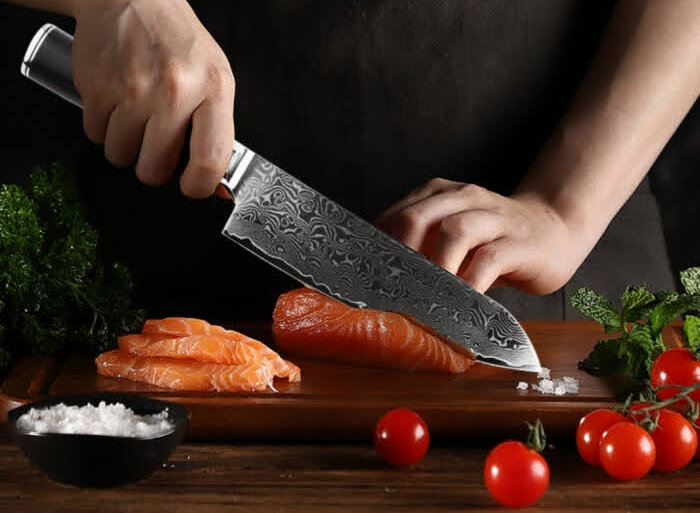Among the myriad tools that a chef wields in the kitchen like a maestro conducting an orchestra, the chef's favorite Damascus knife stands in a realm of its own. Revered for its craftsmanship and cutting prowess, this knife isn't just a utensil but rather a well-honed instrument of culinary excellence. But what makes the Damascus knife a go-to choice for kitchen professionals worldwide?
The allure of the Damascus knife goes beyond its aesthetic appeal. At its core lies a legacy of superior performance, exceptional craftsmanship, and a historic prestige that stretches back to antiquity. Often described in terms of its intriguing patterns resembling flowing water or luxuriant damask silk, the Damascus knife plays a significant role as a quintessential tool for esteemed chefs. Explore more about the origin of this fascinating material on this history page.

Why Chefs Trust Damascus Steel
When choosing knives, chefs often prioritize precision and longevity. The Damascus steel, known for its distinctive wavy patterns, is comprised of multiple layers of steel fused together. This old-world technique results in blades that are not only beautiful but also resilient and exceptionally sharp. The unique construction strikes a perfect balance between hardness and flex, granting the knife an edge that remains sharper, longer.
The intricate forging process of Damascus steel involves folding and hammering the steel layers to create a blade structure that can sustain heavy use without chipping. It's this very process of heating and folding that gives the blade its trademark wavy look. Die-hard kitchen pros can learn more details about this process from this detailed article.
The Chef-Tested Endorsement
A testament to the Damascus knife's place in top kitchens is its endorsement by chefs who depend heavily on the reliability of their tools. These chefs attest to the blade's delicate handling of ingredients, its capacity to maintain sharpness while delivering precise cuts, and the minimal force required while slicing, dicing, and chopping.
Many kitchens often incorporate a selection of Damascus knives, each tailored to specific kitchen tasks. Chef-tested reviews illuminate why this blade is preferred over conventional counterparts. You can dive deeper into these insights and chef feedback in articles discussing chef-tested Damascus knives.
Beyond Functionality: The Aesthetic Appeal
While performance is a criterion, design speaks volumes of a blade's heritage. The exquisite patterns decorating the surface of a Damascus knife are unparalleled, boasting uniqueness as no two blades exhibit the same design. This allure is not just skin-deep. The layers are what confer the blade's stability and strength, making each Damascus knife a labor of both art and practicality.
Incorporating a Damascus knife in one's kitchen isn't merely a purchaseit's an investment in culinary sophistication and a thoughtful acquisition that reflects an appreciation for fine craftsmanship. For a guide on paring such elegance with utility, refer to our piece on professional-grade Damascus chef knives.
Future of Damascus Knives in Culinary Arts
As the culinary world evolves, so does the need for tools that support contemporary kitchen demands. The legacy of the Damascus knife ensures its place in future culinary practices as more chefs recognize the advantages of its robustness and aesthetics.
In conclusion, the allure of the chef's favorite Damascus knife isn't merely a function of its historical legacy or aesthetic beauty but its promise of precision, durability, and elegance that sets it apart as a must-have in today's fast-paced kitchens. To read more about advancements and innovations in Damascus steel, consider diving into this comprehensive guide.

Frequently Asked Questions
What sets a Damascus knife apart from other knives?
The Damascus knife's unique structure is created by layering different types of steel to produce fostered strength, sustained sharpness, and unparalleled beauty observable in its wavy pattern.
How should one maintain a Damascus knife?
Proper maintenance includes regular honing, storing appropriately to prevent blade damage, and periodically oiling to prevent rust, thus ensuring long-lasting utility.
Is a Damascus knife suitable for all kitchen tasks?
While ideal for precision tasks, certain styles of Damascus knives may better suit specific tasks due to variations in blade size and flexibility.
This article contains affiliate links. We may earn a commission at no extra cost to you.


























